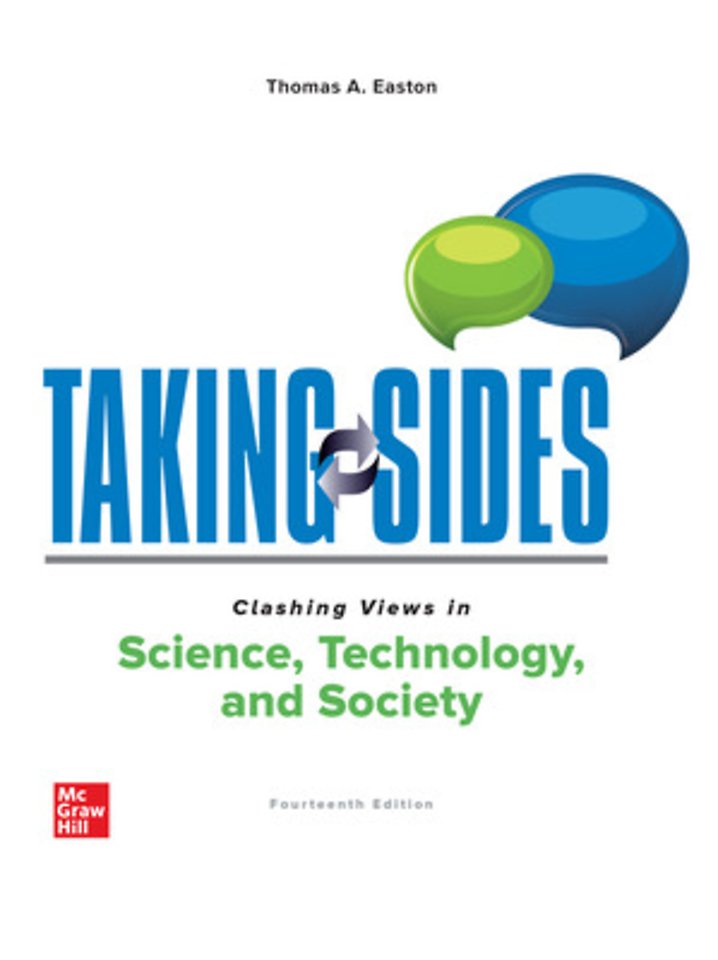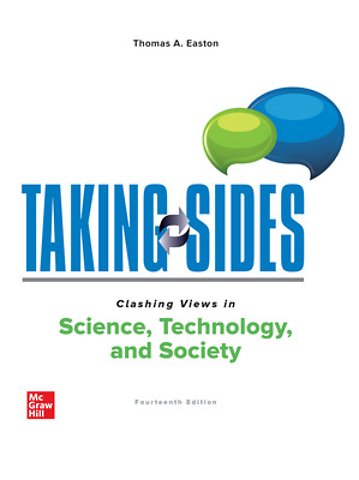Samenvatting
The Taking Sides Collection on McGraw-Hill Create® includes current controversial issues in a debate-style format designed to stimulate student interest and develop critical thinking skills. This Collection contains a multitude of current and classic issues to enhance and customize your course. You can browse the entire Taking Sides Collection on Create or you can search by topic, author, or keywords. Each Taking Sides issue is thoughtfully framed with Learning Outcomes, an Issue Summary, an Introduction, and an "Exploring the Issue" section featuring Critical Thinking and Reflection, Is There Common Ground?, Additional Resources, and Internet References. Go to the Taking Sides Collection on McGraw-Hill Create® at www.mcgrawhillcreate.com/takingsides and click on "Explore this Collection" to browse the entire Collection. Select individual Taking Sides issues to enhance your course, or access and select the entire Easton: Taking Sides: Clashing Views in Science, Technology, and Society, 14/e book here http://create.mheducation.com/createonline/index.html#qlink=search%2Ftext%3Disbn:1260579956 for an easy, pre-built teaching resource. Visit http://create.mheducation.com for more information on other McGraw-Hill titles and special collections.
Specificaties
Lezersrecensies
Inhoudsopgave
gue that the true hazards of cell phones have been covered up by the telecommunications industry in a way similar to the way the tobacco industry covered up the hazards of tobacco and the fossil fuels industry covered up the climate implications of carbon dioxide emissions. David H. Gorski argues that Hertsgaard and Dowie, despite their disclaimer denying that they are saying that cell phones cause cancer are clearly and misleadingly stoking fears that cell phones do precisely that. The research to date does not demonstrate that wireless phones cause cancer or have other adverse health effects.<br><br><u>Issue: Should Genetically Modified Foods Be Labeled?</u><br>Yes: Todd Daloz, from “Testimony before the U.S. House of Representatives Committee on Energy and Commerce, Subcommittee on Health, Hearing on ‘A National Framework for the Review and Labeling of Biotechnology in Food,’” U.S. House of Representatives (2015) <br>No: L. Val Giddings, from “Testimony before the U.S. House of Representatives Committee on Energy and Commerce, Subcommittee on Health, Hearing on ‘A National Framework for the Review and Labeling of Biotechnology in Food,’” U.S. House of Representatives (2015) <br><br>Todd Daloz argues that Vermont's legislation requiring labeling of genetically modified crops (GMOs) is amply justified by the public's need for factual information about the food they eat, and that federal preemption of state labeling laws, without providing a suitable substitute, is unreasonable. L. Val Giddings argues that there is no scientific doubt that GMO crops are safe to eat, the federal government already has sufficient authority to regulate the sale and labeling of GMO foods, and the push for labeling laws is a thinly disguised effort to ban GMOs in favor of less safe and more expensive alternatives, such as organic foods.<br><br>Unit 4: Space<br><br><u>Issue: Should We Try to Stop an Asteroid or Comet Impact?</u><br>Yes: National Science and Technology Council, from “National Near-Earth Preparedness Strategy and Action Plan: A Report by the Interagency Working Group for Detecting and Mitigating the Impact of Earth-Bound Near-Earth Objects,” www.whitehouse.gov (2018) <br>No: Clark R. Chapman, from “What Will Happen When the Next Asteroid Strikes?" Astronomy Magazine (2011)<br><br>The Interagency Working Group for Detecting and Mitigating the Impact of Earth-Bound Near-Earth Objects of the National Science and Technology Council (NEO) argues that NEO impacts pose a significant challenge to society. Dealing with that challenge requires national and international cooperation to detect potential impacts, devise ways to ward them off, and to devise procedures for coping with and recovering from NEO impact emergencies. Clark R. Chapman argues that though the consequences of an asteroid or comet impact would be catastrophic, efforts to prevent the impact would be futile. It is far more appropriate to incorporate such impact disasters into more conventional disaster planning.<br><br><u>Issue: Will the Search for Extraterrestrial Life Ever Succeed?</u><br>Yes: Seth Shostak, from “Using Radio in the Search for Extraterrestrial Intelligence,” U.S. House of Representatives (2014)<br>No: Peter Schenkel, from “SETI Requires a Skeptical Reappraisal,” Skeptical Inquirer (2006)<br><br>Radio astronomer and Search for Extraterrestrial Intelligence (SETI) researcher Seth Shostak defends SETI and argues that if the assumptions behind the search are well grounded, “it is not hyperbole to suggest that scientists could very well discover extraterrestrial intelligence within two decades.” Peter Schenkel argues that SETI’s lack of success to date, coupled with the apparent uniqueness of Earth’s history and suitability for life, suggests that intelligent life is probably rare in our galaxy and that the enthusiastic optimism of SETI proponents should be reined in.<br><br><u>Issue: Should the United States Continue Its Human Spaceflight Program?</u><br>Yes: Committee on Human Spaceflight, from “Pathways to Exploration: Rationales and Approaches for a U.S. Program of Human Space Exploration,” The National Academies Press (2014)<br>No: Amitai Etzioni, from “Final Frontier vs. Fruitful Frontier: The Case for Increasing Ocean Exploration,” Issues in Science and Technology (2014)<br><br>The National Research Council’s Committee on Human Spaceflight argues that the combination of the pragmatic benefits of and the human aspirations associated with human spaceflight are great enough to justify continuing the United States’ human spaceflight program. Professor Amitai Etzioni argues that the Earth’s oceans offer more potential discoveries, more resources for human use, and more contributions to national security and disaster preparedness than outer space. The exploration of space should be replaced by the exploration of the oceans, and the necessary budgetary resources should be taken from NASA.<br><br>Unit 5: The Computer Revolution<br><br><u>Issue: Do Artificial Intelligence Research and Applications Need to Be Regulated? </u><br>Yes: Matthew U. Scherer, from “Regulating Artificial Intelligence Systems: Risks, Challenges, Competencies, and Strategies,” Harvard Journal of Law and Technology (2016) <br>No: Amitai Etzioni and Oren Etzioni, from “Perspective: Should Artificial Intelligence Be Regulated,” Issues in Science and Technology (2017) <br><br>Matthew U. Scherer argues that concerns about artificial intelligence‘s (AI's) impact on society warrant legislative action, perhaps in the form of an Artificial Intelligence Development Act that would create a regulatory agency "tasked with certifying the safety of AI systems" and the competence of practitioners. The Act would also create a liability system to allow existing legal systems to ensure compensation for victims of AI and motivate increased attention to safety. Amitai Etzioni and Oren Etzioni argue that neither artificial intelligence (AI) nor its risks are well defined. What is needed is oversight systems or "AI Guardians" and a Cyber Age Commission that would examine the situation and promote public dialogue before seeking regulatory solutions.<br><br><u>Issue: Must Self-Driving Cars Be Safer Than the Average Human Driver? </u><br>Yes: Gill Pratt, from statement on “Self-Driving Cars: Road to Deployment,” before the U.S. House of Representatives Committee on Energy & Commerce, Subcommittee on Digital Commerce and Consumer Protection (2017) <br>No: Robbie Diamond and Amitai Y. Bin-Nun, from statement on “Self-Driving Cars: Road to Deployment,” before the U.S. House of Representatives Committee on Energy & Commerce, Subcommittee on Digital Commerce and Consumer Protection (2017) <br><br>Gill Pratt argues that even though self-driving cars will be safer than human-driven cars, people will not accept them until they are much, much safer than human drivers. Robbie Diamond and Amitai Y. Bin-Nun argue that the deployment of self-driving cars will reduce traffic deaths (most of which are due to human error) and should be permitted as soon as the safety of the vehicles exceeds that of the average human driver. <br><br>Unit 6: Ethics<br><br><u>Issue: Should Animals Be Considered Persons? </u><br>Yes: Karen Davis, from “The Provocative Elitism of 'Personhood' for Nonhuman Creatures in Animal Advocacy Parlance and Polemics,” Journal of Evolution and Technology (2014) <br>No: Richard L. Cupp, from “Human Responsibility, Not Legal Personhood, for Nonhuman Animals,” Engage (2015) <br><br>Karen Davis argues that it is not only the "higher" animals that we should consider "persons." “Lower” animals should not be considered nonpersons and doomed to exploitation. Richard L. Cupp argues that there is no need for radical restructuring of our legal system to grant animals personhood. Rather, we should focus on human legal accountability for responsible treatment of nonhuman animals. <br><br><u>Issue: Should Genetically Engineered Mosquitoes Be Released into the Environment to Fight Disease?</u><br>Yes: Hadyn Parry, from “Testimony before the U.S. House of Representatives Committee on Science, Space, and Technology, Hearing on ‘Science of Zika: The DNA of an Epidemic,’” U.S. House of Representatives (2016)<br>No: Eric Hoffman, from “Genetically Engineered Mosquitoes in the U.S.,” Friends of the Earth (2012)<br><br>Hadyn Parry argues that genetically engineered mosquitoes hold the potential to reduce mosquito populations and control the spread of diseases such as Zika and dengue. Eric Hoffman, a biotechnology campaigner with Friends of the Earth, argues that a great deal of research remains to be done to prove the safety to both the environment and public health of releasing genetically engineered mosquitoes. In addition, medical ethics require that participants in a medical trial must be able to opt out at any time, which means that a single resident of a release area must be able to call a halt to the release program.<br><br><u>Issue: Is Gene-Editing of Human Embryos Coming Soon?</u><br>Yes: Antonio Regalado, from “Engineering the Perfect Baby,” MIT Technology Review (2015)<br>No: Elizabeth McNally, from “Testimony before the U.S. House of Representatives Committee on Science, Space, and Technology, Subcommittee on Research and Technology, Hearing on ‘The Science and Ethics of Genetically Engineered Human DNA,’” U.S. House of Representatives (2015)<br><br>Antonio Regalado describes recent progress in using the new CRISPR technology to edit the genes of mammalian cells, including embryos. He
argues that although many people involved in the research are cautious, what was until recently only a theoretical possibility is now a very real possibility. We are very close to being able to engineer the genes of human embryos (for a variety of reasons) and most people have no idea of what is coming. Elizabeth McNally agrees that the technology is developing rapidly and has much to offer but is more reserved in her evaluation. She argues that it is necessary to regulate the technology and its uses, including limiting or prohibiting uses where changes would be passed to the next generation. However, “the justified use of this approach is certainly conceivable and may one day be appropriate.”<br>
Rubrieken
- advisering
- algemeen management
- coaching en trainen
- communicatie en media
- economie
- financieel management
- inkoop en logistiek
- internet en social media
- it-management / ict
- juridisch
- leiderschap
- marketing
- mens en maatschappij
- non-profit
- ondernemen
- organisatiekunde
- personal finance
- personeelsmanagement
- persoonlijke effectiviteit
- projectmanagement
- psychologie
- reclame en verkoop
- strategisch management
- verandermanagement
- werk en loopbaan

